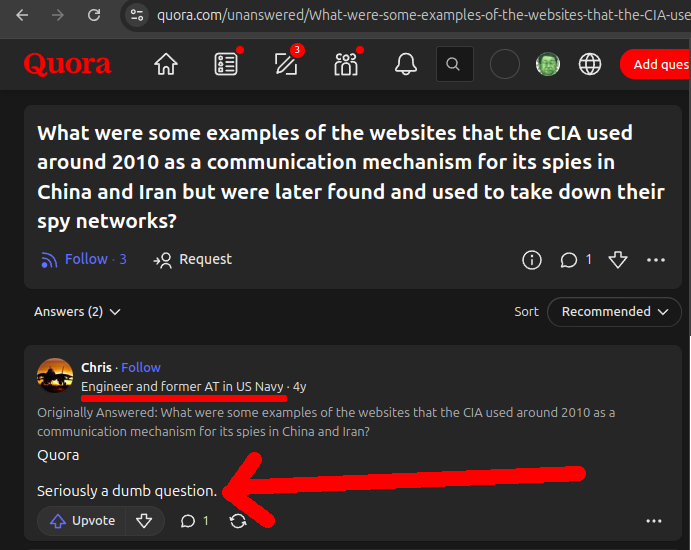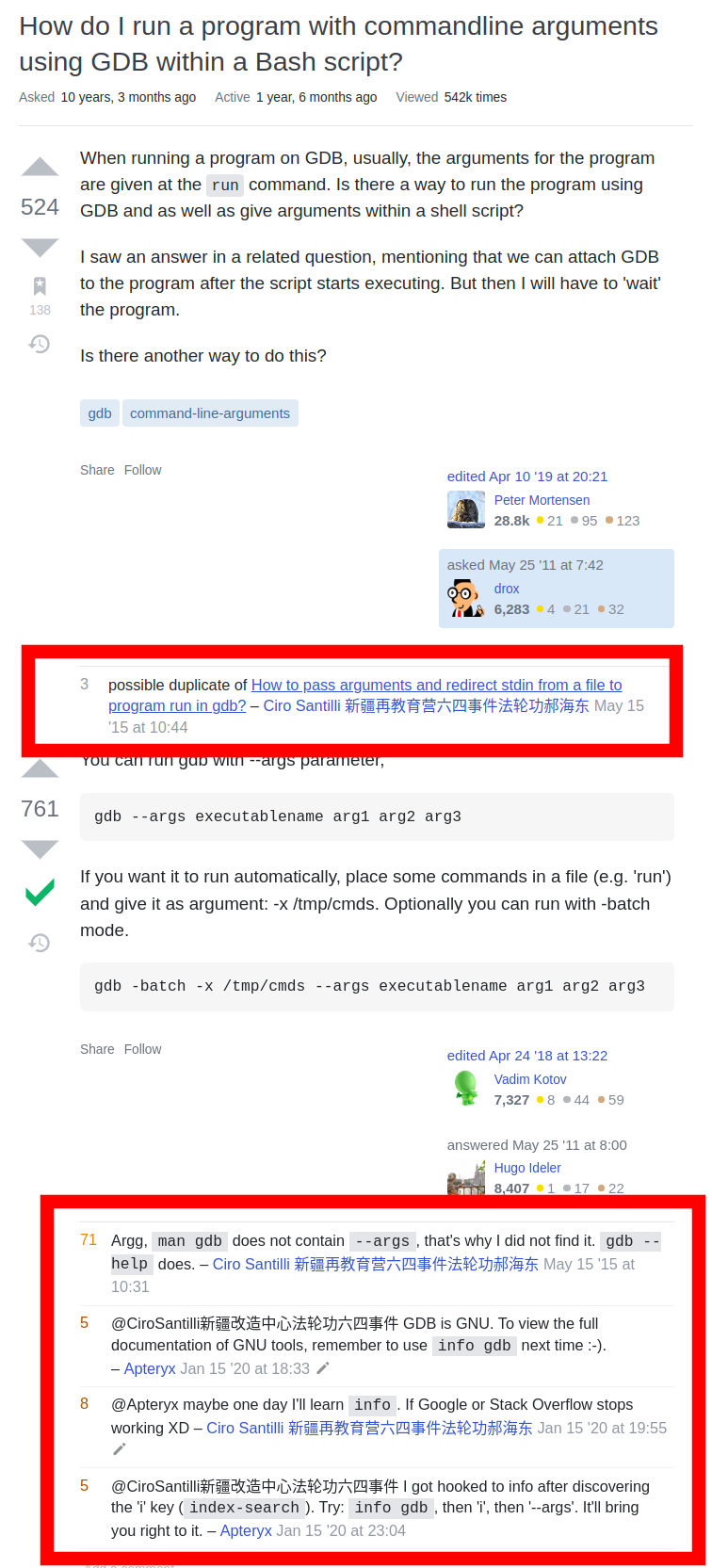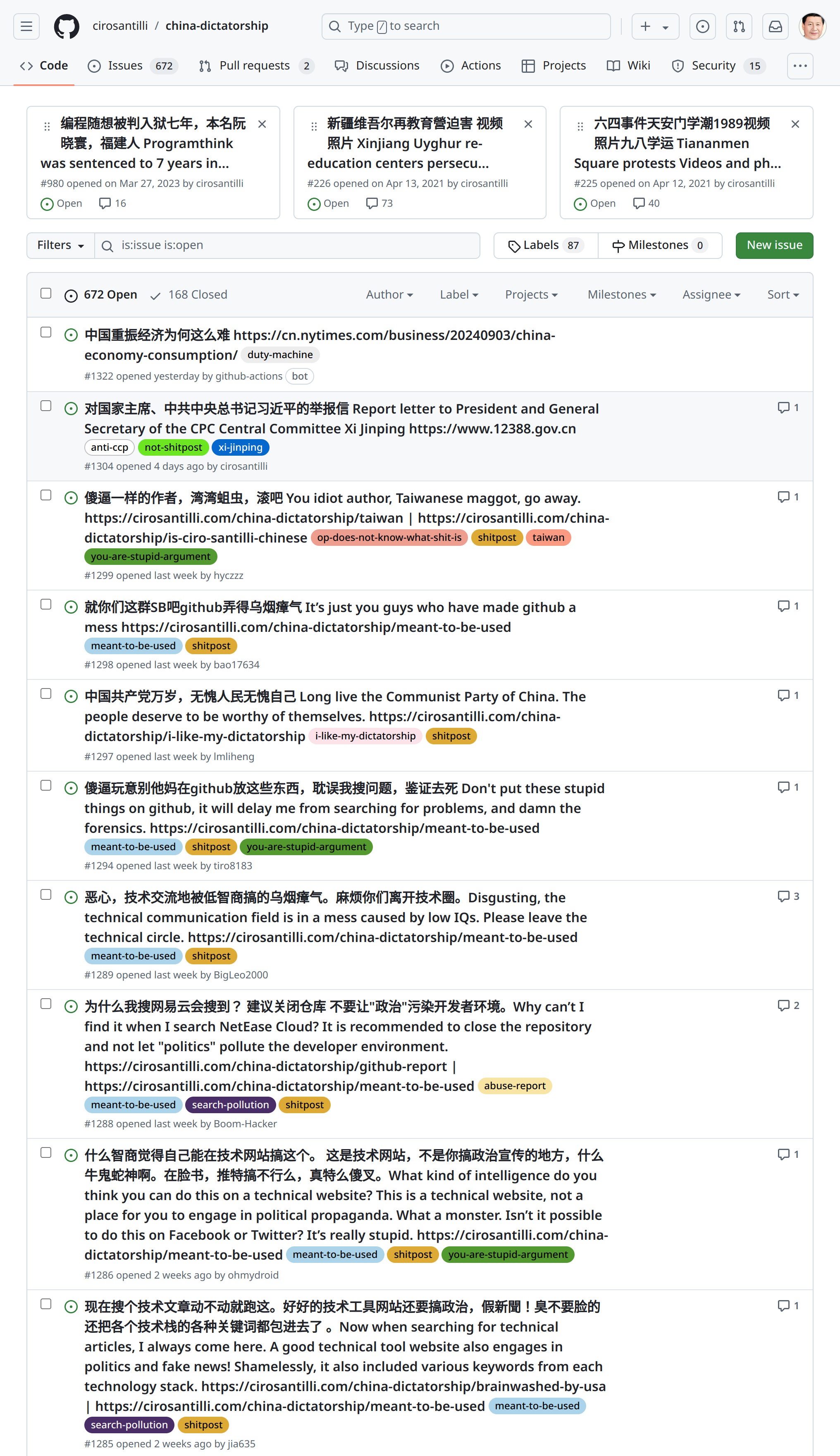Aratu Week 2024 Talk by Ciro Santilli: My Best Random Projects Everything is built from source and easily modifiable, powered by Buildroot by  Ciro Santilli 40 Created 2024-09-26 Updated 2025-07-16
Ciro Santilli 40 Created 2024-09-26 Updated 2025-07-16
The following are stored in submodules:
submodules/binutils-gdb/
submodules/buildroot/
submodules/gcc/
submodules/glibc/
submodules/linux/
submodules/qemu/So you can modify source, rebuild and that's it, its in the VM.
asmlinkage __visible void __init __no_sanitize_address start_kernel(void)
{
pr_info("I'VE HACKED THE LINUX KERNEL!!!");Rebuild Linux:
./build-linuxRerun:
./runAnd after boot we see:
<6>[ 0.000000] I'VE HACKED THE LINUX KERNEL!!! Aratu Week 2024 Talk by Ciro Santilli: My Best Random Projects Get a Linux terminal on QEMU by  Ciro Santilli 40 Created 2024-09-26 Updated 2025-07-16
Ciro Santilli 40 Created 2024-09-26 Updated 2025-07-16
One time setup:
git clone https://github.com/cirosantilli/linux-kernel-module-cheat
cd linux-kernel-module-cheat
sudo apt install docker
python3 -m venv .venv
. .venv/bin/activate
./setup
./run-docker create
./run-docker shYou are now in Docker.
Build everything from source inside docker:
./build --download-dependencies qemu-buildrootOutcome:
<6>[ 1.383114] NET: Registered protocol family 17
<6>[ 1.383682] 9pnet: Installing 9P2000 support
<6>[ 1.385473] IPI shorthand broadcast: enabled
<6>[ 1.385701] sched_clock: Marking stable (1355697980, 27047205)->(1385555667, -2810482)
<6>[ 1.387744] ALSA device list:
<6>[ 1.387843] No soundcards found.
<6>[ 1.535981] ata2.00: ATAPI: QEMU DVD-ROM, 2.5+, max UDMA/100
<5>[ 1.543470] scsi 1:0:0:0: CD-ROM QEMU QEMU DVD-ROM 2.5+ PQ: 0 ANSI: 5
<6>[ 1.548952] EXT4-fs (vda): mounting ext2 file system using the ext4 subsystem
<6>[ 1.555909] EXT4-fs (vda): mounted filesystem without journal. Opts: (null)
<6>[ 1.556145] VFS: Mounted root (ext2 filesystem) on device 254:0.
<6>[ 1.557451] devtmpfs: mounted
<6>[ 1.605639] Freeing unused kernel image (initmem) memory: 1248K
<6>[ 1.605875] Write protecting the kernel read-only data: 16384k
<6>[ 1.607977] Freeing unused kernel image (text/rodata gap) memory: 2044K
<6>[ 1.610190] Freeing unused kernel image (rodata/data gap) memory: 1012K
<6>[ 1.610495] Run /sbin/init as init process
<6>[ 1.683311] tsc: Refined TSC clocksource calibration: 3293.671 MHz
<6>[ 1.683618] clocksource: tsc: mask: 0xffffffffffffffff max_cycles: 0x2f79f177aae, max_idle_ns: 440795226653 ns
<6>[ 1.683849] clocksource: Switched to clocksource tsc
<3>[ 1.694241] 9pnet_virtio: no channels available for device host_data
mount: mounting host_data on /mnt/9p/data failed: No such file or directory
qemu-system-x86_64: warning: 9p: degraded performance: a reasonable high msize should be chosen on client/guest side (chosen msize is <= 8192). See https://wiki.qemu.org/Documentation/9pset.
<3>[ 1.712287] overlayfs: overlapping upperdir path
mount: mounting overlay on /mnt/overlay failed: Too many levels of symbolic links
hello S98
hello .profile
/lkmc
root@buildroot# pwd
/lkmc
/lkmc
root@buildroot# Aratu Week 2024 Talk by Ciro Santilli: My Best Random Projects Prelude: initial reports without specific websites (2018-) by  Ciro Santilli 40 Created 2024-09-26 Updated 2025-07-16
Ciro Santilli 40 Created 2024-09-26 Updated 2025-07-16
Aratu Week 2024 Talk by Ciro Santilli: My Best Random Projects Package managers by  Ciro Santilli 40 Created 2024-09-26 Updated 2025-07-16
Ciro Santilli 40 Created 2024-09-26 Updated 2025-07-16
Aratu Week 2024 Talk by Ciro Santilli: My Best Random Projects Stack Overflow attacks by  Ciro Santilli 40 Created 2024-09-26 Updated 2025-07-16
Ciro Santilli 40 Created 2024-09-26 Updated 2025-07-16
Welcome to my home page!
Welcome to my home page!
In the context of an A* search, a heuristic function is said to be admissible if it does not overestimate the cost to reach the goal. Such functions can also be viewed as being "optimistic".
When using an admissible heuristic, A* is guaranteed to return a cost-optimal solution, i.e. the best path. Let's prove it by contradiction:
Assume that the algorithm returned a path, the cost of which is greater than that of the optimal path . Let's call the cost of the path that was followed, and the cost of , noting that . First, we can safely assume that at least one node in was not expanded during the algorithm's execution (if all nodes of were expanded, then would have been chosen instead since that would lead to a lower path cost). Without loss of generallity, let's take the first occurance of such unexpanded node and name it "n". Let's call the actual cost from n to the destination and define as the cost of the optimal path starting from the origin all the way to n. Remember that A* is a best-first search on the value of , so for all unexpanded nodes. Here's what we've got:
Now note that is equal to "the cost to reach n following the optimal path" + "the cost to reach the goal starting from n, following the optimal path". That's just equal to the total cost of the optimal path! So, both and hold simultaneously which obviously constitutes a contradiction.
[1]: Remember than (our heuristic) is just a hint to prioritize certain expansions over others. When everything is expanded however, is the sole metric that will be considered, which will always lead to the optimal path being selected, that being .
Welcome to my home page!
When we boil rice for example, we observe the grains swelling and becoming much more soft. This manifests itself in the process of starch gelatinization.
At high temperatures, the intermolecular bonds of the starch molecules (for example the double helices formed by amylopectin) are broken down (new water-starch hydrogen bonds are formed) and thus the structure of the starch granules is altered. First the amorphous regions are disrupted and then the granule's whole structure gets effected. The granules lose their integrity and burst. Amylose (and a smaller amount of amylopectin) molecules leave the granule and contribute to the increased viscosity of the liquid.
When the temperature drops, recrystallization occurs. This is referred to as starch retrogradation and is responsible for bread staling.
The Sun's rays are not monochromatic and represent photons of various wavelength that may or may not be part of the visible light. In glass, some ions absorb particular wavelengths in the visible light and emit only the remaining wavelength. This is what contitutes the colour of an object. If an ion absorbs photons of red light, it appears bluish. These ions are normally transition metals as they can absorb photons of wavelengths that we can see.
The colour that we perceive by the glass is not only related to the ions contained in the glass but it also depends on the network-former/modifiers present. This is because the ions interact with them, which influences each ion's orbital energy levels and consequently the light that they can absorb. Lastly the colour also depends on the concentration of the ion, its nature (valency) and the heterogeneity of the glass. A portion of the light that arrives in the surface of the glass gets reflected and doesn't interact further.
- () yellow-brown
- () blue
- () blue
- () red
- () green
- () yellow
- () green
- () yellow
- () violet
This type of glass accounts for 90% of commercially used glass. Its uses range from windows to even jars. It is typically made of (w/w) 70% silica (), 10% lime () and 15% soda ().
Silica is the network-former of the glass. Silica, is found in nature as quartz and its pure form is the ideal glass. Nevertheless, soda is added in order to reduce the temperature at which the glass is softened, thus making its production cheaper and better to work with. Since sodium cations are very soluble in water, lime is added in order to decrease the solubility of the glass.
Silica is obtained by sand and mixed with soda ash () and limestone (). These materials are mixed together to get a powder called batch which is later combined with cullet (recycled glass pieces) in order for the glass to once again soften at even lower temperatures. The mix is heated into an oven at temperatures around . Impurities that arise are removed and the melted mass is put into moulds to take its final shape. Annealing is also taking place at the end to ensure glass durability, which is the process of reheated the bottle and then slowly cooling it down in order to further stabilize the structure of the glass.
Soda lime glass is recyclable.
The works of Zachariasen and Warren (Network Theory and its verification by X-ray diffraction) resulted in big advancements in the study of glass structure. This theory can predict a large number properties of conventional glasses. His theory was later extended by Dietzel.
- Network-modifiers that are placed in order to disrupt the organized structure of the network. As they are cations they place themselves close to the anions (oxygen in for example) that connects the network. They break some bridging covalent bonds and "stick" to the broken ends electrostatically forming ionic bonds of lower energy. This reduces the viscosity so that the glass can be manufactured more efficiently, as it softens in a lower temperature.
- Intermediates which assist in glass formation by forming intermediate bonds to oxygen. They can't form glasses on their own.
In order for glass to form, the network-former should (although there are exceptions) form polyhedral groups in its simplest form. (For example silica, forms tetrahedrals). Each polyhedron should only connect with its neighbouring once via bonding bridges formed by the anions (in this example an Si-O-Si).
The network-former of silicate glass is which is
A common misconsception suggests that glass is a liquid of high viscosity. This not the case. Glass is its own distinct state of matter that doesn't coincide with any other classical one. Every liquid (except Helium) can be turned into glass, if a sufficiently rapid cooling takes place. This process is called vitrification. When a liquid is cooled (water for example) it normally goes through the process of crystallization. We say that the water is frozen as ice forms which has a very specific structure that is characterized by its stability (crystalline solid). If the cooling happens quickly enough, the water molecules don't have the opportunity to occupy the lowest energy sites and this is how the amorphous solids forms.
Annealing illustrates this phenomenon. When glass is cooled down in order to solidify, this process must be done during a specific time interval in order for the molecules to have enough time to position themselves in a more stable manner. If during the glass making process, the produced glass has been solidified too rapidly, then the stress present in the solid makes it too fragile to the point where it can rupture/shatter even during handling. By reheating the glass and slowly droping the temperature again, we ensure that the glass object has gained a much more stable structure.
As crystalline solids have a melting point, amorphous ones have a glass transition temperature which surprisingly depends on thermal history (how rapidly was the former liquid made into glass?). Around this temperature point, the viscosity of the glass increases rapidly and can be classified as a solid (under classical terms). It should be noted that the viscosity as well as other properties of the substance made into glass, present a continuous change as the temperature changes. This is not the case with "ordinary" freezing as liquid water turns spontaneously into a solid in a discontinuous manner (during the freezing process the temperature stays constant. Immediately below all the water has turned into ice).
The most commonly used component of glass is silica, an element that is abundant in the Earth's crust (30% by mass). During the formation of our planet, rocks containing a high percentage of silica were melted and cooled rapidly under the hostile conditions of the environment (volcanic eruptions, lighting strikes), thus natural glass was made such as obsidian. Man-made glass was first produced about 4000 years ago and it was used mainly for jewellery. Then, glass couldn't be obtained in a pure/homogenous form and lacked transparency.
Glass continued to spread around the world and new techniques were invented but still, transparent glass could not be achieved until the middle ages.
This important step took place in the island of Murano. Cristallo was the first clear, colourless, transparent glass and was made by the Venetian glass blower Cesaro Barovier in the 15th century.
Another marking point in the glassmaking industry was the invention of crown glass, which was a simpler process that prevailed in the middle ages. The glass that was manufactured by this method is sometimes thicker in the bottom than at the top. That is not attributed to the viscosity of the glass (a common misconception) but rather to the glass making process itself. It was slowly replaced in the 19th century by cylinder blown sheet glass, another hand-blown technique.
White is often seen as a symbol of purity and virtue (even the ancient Egyptians and Greeks shared this view ), thus there was a need for effective fabric whitening methods.
Since the ancient times, people used a widely available "bleaching product", the sun itself (the small amounts of UV radiation that reach the surface of the earth, break up bonds of stain molecules that are responsible for the colours that we perceive).
Later in ancient rome, before the invention of soap, other alkaline products were used as cleaning agents, such as urine (which breaks down to ammonia). These only removed the grease stains from the cloth, before it was left to dry and whiten in the sun.
Ultimately, from wood ashes a better cleaning product was made which was lye. Lye is used as the main ingredient is soap making.
In the 17th century, the Dutch were leading the bleaching market. They invented a new method of bleaching which involved additions of bases and acid to the cloth. Firstly, the fabrics were soaked in lye in order to remove grease stains and then washed clean. Then they were spread out in specific places, called bleachfields. There, on the grass, they got whitened under the sun. This process was repeated several times. Lastly, sour milk was placed on the fabric in order to neutralize the bases added prior and once again a wash took place. This process was not only physically demanding, but also took months to finish.
In the 17th century, the Dutch were leading the bleaching market. They invented a new method of bleaching which involved additions of bases and acid to the cloth. Firstly, the fabrics were soaked in lye in order to remove grease stains and then washed clean. Then they were spread out in specific places, called bleachfields. There, on the grass, they got whitened under the sun. This process was repeated several times. Lastly, sour milk was placed on the fabric in order to neutralize the bases added prior and once again a wash took place. This process was not only physically demanding, but also took months to finish.
Thankfully, after the discovery of elemental Chlorine by Karl Wilhelm Scheele, another scientist came up with a faster way to bleach clothes. He was Claude Berthollet, who made in 1789, what is known as "Eau de Javel" (commonly known as liquid bleach), which is a widely used bleach in laundry, cleaning and water treatment. That bleach consists of a solution of 3-6% NaClO.
Pinned article: Introduction to the OurBigBook Project
Welcome to the OurBigBook Project! Our goal is to create the perfect publishing platform for STEM subjects, and get university-level students to write the best free STEM tutorials ever.
Everyone is welcome to create an account and play with the site: ourbigbook.com/go/register. We belive that students themselves can write amazing tutorials, but teachers are welcome too. You can write about anything you want, it doesn't have to be STEM or even educational. Silly test content is very welcome and you won't be penalized in any way. Just keep it legal!
Intro to OurBigBook
. Source. We have two killer features:
- topics: topics group articles by different users with the same title, e.g. here is the topic for the "Fundamental Theorem of Calculus" ourbigbook.com/go/topic/fundamental-theorem-of-calculusArticles of different users are sorted by upvote within each article page. This feature is a bit like:
- a Wikipedia where each user can have their own version of each article
- a Q&A website like Stack Overflow, where multiple people can give their views on a given topic, and the best ones are sorted by upvote. Except you don't need to wait for someone to ask first, and any topic goes, no matter how narrow or broad
This feature makes it possible for readers to find better explanations of any topic created by other writers. And it allows writers to create an explanation in a place that readers might actually find it.Figure 1. Screenshot of the "Derivative" topic page. View it live at: ourbigbook.com/go/topic/derivativeVideo 2. OurBigBook Web topics demo. Source. - local editing: you can store all your personal knowledge base content locally in a plaintext markup format that can be edited locally and published either:This way you can be sure that even if OurBigBook.com were to go down one day (which we have no plans to do as it is quite cheap to host!), your content will still be perfectly readable as a static site.
- to OurBigBook.com to get awesome multi-user features like topics and likes
- as HTML files to a static website, which you can host yourself for free on many external providers like GitHub Pages, and remain in full control
Figure 3. Visual Studio Code extension installation.Figure 4. Visual Studio Code extension tree navigation.Figure 5. Web editor. You can also edit articles on the Web editor without installing anything locally.Video 3. Edit locally and publish demo. Source. This shows editing OurBigBook Markup and publishing it using the Visual Studio Code extension.Video 4. OurBigBook Visual Studio Code extension editing and navigation demo. Source. - Infinitely deep tables of contents:
All our software is open source and hosted at: github.com/ourbigbook/ourbigbook
Further documentation can be found at: docs.ourbigbook.com
Feel free to reach our to us for any help or suggestions: docs.ourbigbook.com/#contact











